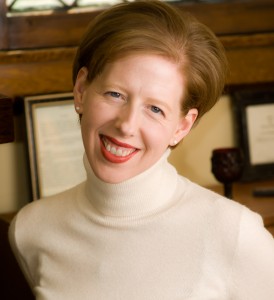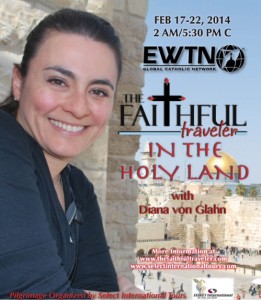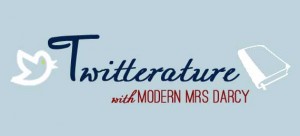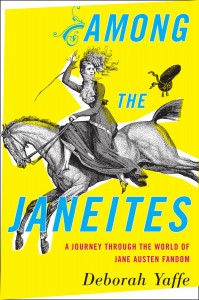Following is my column that appears in the current print edition of The Catholic Post.
A pilgrimage to the Holy Land is an aspiration of many Christians. It won’t surprise you to know that I am among those who have that desire.
Years ago, my husband and I were watching an interview on EWTN with Steve Ray, the Catholic convert and apologist, I mentioned that I would love to go on one of his “Footprints of God” pilgrimages that he and his wife Janet lead to the Holy Land. In the interview, Ray mentioned especially that bringing the entire family to the Holy Land, especially teens and young adults, is unparalleled for growing in faith for a range of generations. We haven’t quite come to an agreement about when and how the pilgrimage will take place, but I’m still hoping it will happen someday.
Your Holy Land pilgrimage, like mine, may be far off in the future, but that doesn’t mean we can’t benefit, especially during Lent and Easter, from meditating on early Jewish & Christian customs, culture, and place.
I hesitate to say it, but it is true that while we wait, books (and videos, too) can be the next best thing to an actual Holy Land pilgrimage.
In the past, I’ve reviewed several books that inform or inspire, like Fr. Mitch Pacwa’s The Holy Land: An Armchair Pilgrimage, or Jesus: A Pilgrimage, Fr. James Martin’s musings on visiting the Holy Land over the years. Even local son Venerable Fulton Sheen wrote a book (with fascinating vintage photographs) called, This is the Holy Land.
One of my favorite aspects of these books is their ability to put readers in the time and place Jesus lived, and help explain some of the aspects about our faith that we take for granted.
The most recent book by Scott Hahn, The Fourth Cup: Unveiling the Mystery of the Last Supper and the Cross while not a Holy Land pilgrimage book, has a similar effect and scope.
Scott Hahn is well-known to many as a Protestant pastor who converted to Catholicism in the 1980s, and has been tirelessly writing books, giving talks, and otherwise spreading the Catholic faith, ever since. He’s best known probably for his most popular book, The Lamb’s Supper: The Mass as Heaven on Earth.
Most people in the early 1990s, like me, learned of Hahn through an audio version of his conversion story, which was widely distributed during those years. I recall a friend giving me a cassette tape of Hahn’s first conversion story. (Yes, young ones reading this column, there are still people alive who listened to things on audio cassette. Don’t even get me starting on how people back in “my” college days painstakingly made song mixtapes on audio cassette).
But back to Scott Hahn. He was such a convincing and powerful speaker, and helped me to understand the riches of the Catholic faith that I, as a cradle Catholic, had never understood or appreciated.
Hahn is best at that—helping Catholics and non-Catholics alike, discover or re-discover the richness of the Catholic faith; how our practices—especially the Mass—are rooted solidly in Scripture; and how early Church Fathers point towards what we now practice and believe as Catholics.
As he writes in the preface to the book, when he began giving talks on his conversion to Catholicism, it was often titled, The Fourth Cup, after the fourth cup of the Passover, that Jesus omitted during the Last Supper. The “why” of that, and how Hahn discovered it over the course of his conversion through study and prayer, together make for an engaging, informative read.
The book is organized into 14 chapters, almost all directly relating to the Passover in the Old Testament, and how that directly prefigures Jesus’ sacrifice on the Cross. The first chapter is “What is Finished,” when the young Protestant seminary student Hahn was challenged by a pastor to find out why Jesus said, “It is finished” just before he died; and the remaining chapters help explain how he discovered it, and how it led him directly to the Catholic Church. the rest of the chapters a range of chapters that help explain how the Passover is a type, or prefiguring, of Jesus’ sacrifice on the Cross; to the final chapter “The Paschal Shape of Life,” how we can apply that in our own lives.
One clever aspect of The Fourth Cup are the dozens of sly puns in nearly every sub-headings of sections sprinkled throughout each chapter: such as “Pasch, Presence, and Future” or “A Lamb is Bread for This,” or “Greeks Baring Gifts.”
I found myself writing down multiple quotes from the book, such as:
“God taught Israel to sacrifice not so that his Chosen People would be humiliated but so that they would learn to lay down their lives, to turn away from sin, and to live in the covenant. ‘The sacrifice acceptable to God is broken spirit; a broken and contrite heart.’ (Ps 51)”
As I’ve written before, I’m a lay person when it comes to theology, and so I appreciate a straightforward, manageable read to help me grow in my knowledge and contemplate some of the riches of our faith. The Fourth Cup is just such a book.




 Emily of Deep Valley by Maud Hart Lovelace. (I love all the Betsy-Tacy books, but I’d have to say this is my absolute favorite book of Lovelace).
Emily of Deep Valley by Maud Hart Lovelace. (I love all the Betsy-Tacy books, but I’d have to say this is my absolute favorite book of Lovelace).












